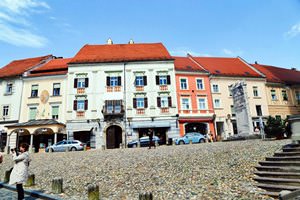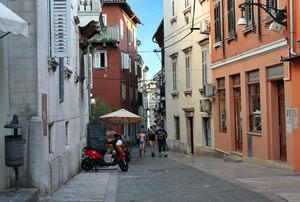 Slovenian national dishes cannot be called widely known. An average European can barely name at least one Slovenian dish. Nevertheless, the cuisine of Slovenia, the country of clean springs, is rich, authentic, and diverse. It was influenced by the cuisines of neighboring countries such as Hungary, Austria, Croatia, and Italy, creating an amazing and unique blend. There are more than a thousand Slovenian dishes. Slovenian traditional welcome bread Pogača is a large, up to 4-centimeter thick, grid cake with whipped eggs and seasonings. This bread is traditionally torn by hands. Locals often eat salads with the addition of dandelions.
Slovenian national dishes cannot be called widely known. An average European can barely name at least one Slovenian dish. Nevertheless, the cuisine of Slovenia, the country of clean springs, is rich, authentic, and diverse. It was influenced by the cuisines of neighboring countries such as Hungary, Austria, Croatia, and Italy, creating an amazing and unique blend. There are more than a thousand Slovenian dishes. Slovenian traditional welcome bread Pogača is a large, up to 4-centimeter thick, grid cake with whipped eggs and seasonings. This bread is traditionally torn by hands. Locals often eat salads with the addition of dandelions.
Slovenia has long become a favorite place of rest among fans of eco-tourism, alpine ski and interesting excursions. The country is so diverse that …
Read further
Read further
Slovenia is a small country that has absorbed the best cultural elements of its neighbors - Austria, Italy, Hungary - to create its own authentic …
Read further
Read further
 Slovenians are very fond of pumpkin oil produced mainly in the eastern part of the country, which is often added to soups and salads to impart an incomparable nutty flavor. It can have a variety of colors, from light and transparent to dark. “Polenta” is a kind of bread made from corn flour boiled in salted water with added fat. Locals drink Austrian beers and Italian wines, drinks of international brands like Coca-Cola, as well as a variety of local and imported juices, coffee, teas, and dairy drinks.
Slovenians are very fond of pumpkin oil produced mainly in the eastern part of the country, which is often added to soups and salads to impart an incomparable nutty flavor. It can have a variety of colors, from light and transparent to dark. “Polenta” is a kind of bread made from corn flour boiled in salted water with added fat. Locals drink Austrian beers and Italian wines, drinks of international brands like Coca-Cola, as well as a variety of local and imported juices, coffee, teas, and dairy drinks.
The Republic of Slovenia is a country of castles and historic architecture. The whole country is built up with structures belonging to the period from …
Read further
Read further
 In Slovenia, lunch is considered the main meal of the day. Slovenians follow western dining etiquette. This means that the knife and fork should be held in the right and left hand respectively, hands should be visible above the table. Being late for formal and informal events is not accepted. Slovenians like to meet for a dinner to chat with old friends or get to know each other better. During business meetings with colleagues, one should not start talking about business until a Slovenian partner mentions them. It is normal to leave 10-15% of the restaurant bill as a tip. The inviter is expected to pay.
In Slovenia, lunch is considered the main meal of the day. Slovenians follow western dining etiquette. This means that the knife and fork should be held in the right and left hand respectively, hands should be visible above the table. Being late for formal and informal events is not accepted. Slovenians like to meet for a dinner to chat with old friends or get to know each other better. During business meetings with colleagues, one should not start talking about business until a Slovenian partner mentions them. It is normal to leave 10-15% of the restaurant bill as a tip. The inviter is expected to pay. 

